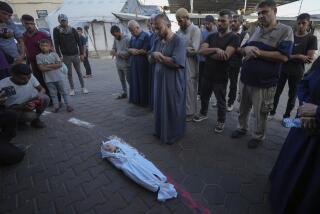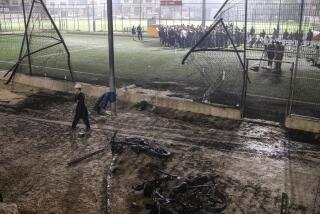U.S. changes its account of hospital bombing, says Afghans requested attack
Reporting from Kabul, Afghanistan — The U.S. military on Monday changed its account of a devastating bombing in northern Afghanistan, saying that Afghan forces, not U.S. advisors, initiated a request for an American airstrike that killed 22 people at a Doctors Without Borders hospital.
It was the first time the U.S. military acknowledged that its airstrike hit the hospital, but the disclosure only deepened the questions surrounding what has become one of the most controversial civilian casualty incidents in nearly 14 years of American combat in Afghanistan.
It remained unclear what role, if any, was played by U.S. special forces on the ground, whether Taliban fighters were in or near the hospital, what kind of training the Afghan forces had undergone to learn the rules of engagement, and why the United States would carry out an attack on a medical facility, which ordinarily would be clearly marked.
NEWSLETTER: Get the day’s top headlines from Times Editor Davan Maharaj >>
Doctors Without Borders, which contends the bombing may have been a war crime, says it gave NATO forces the GPS coordinates for the hospital both before and during the attack.
Gen. John F. Campbell, the top commander of U.S. and NATO forces in Afghanistan, called a news conference at the Pentagon to revise earlier statements that the airstrike was carried out on behalf of American military personnel who were under fire from Taliban insurgents early Saturday in the city of Kunduz.
“We have now learned that on Oct. 3, Afghan forces advised that they were taking fire from enemy positions and asked for air support from U.S. forces,” Campbell said. “An airstrike was then called to eliminate the Taliban threat, and several civilians were accidentally struck.”
Pressed repeatedly about the role U.S. forces played, Campbell said that Afghan forces “asked for air support from a special forces team that we have on the ground,” but that the U.S. team had not been under fire.
American warplanes and ground forces, including an undisclosed number of special operations troops, have been assisting in the Afghan operation to retake Kunduz after it fell to the Taliban last week. Residents said Monday that government forces had nearly regained total control of the city of 300,000 and that many people were venturing outside for the first time since fighting began.
The U.S. military has offered few details of the hostilities that prompted the Saturday airstrike. Officials have said American troops were advising the Afghans who requested the airstrike, but it remained unclear how close they were to the fighting.
Doctors Without Borders, the Nobel Peace Prize-winning medical charity that operates hospitals in poor and strife-torn countries worldwide, accused the U.S. of changing its story and “attempting to pass responsibility to the Afghanistan government.” The group closed the Kunduz hospital Sunday and has called for an independent investigation into the incident.
“The reality is the U.S. dropped those bombs,” said Christopher Stokes, general director of the group that is also known by its French name, Medecins Sans Frontieres, or MSF.
“The U.S. hit a huge hospital full of wounded patients and MSF staff. The U.S. military remains responsible for the targets it hits, even though it is part of a coalition. There can be no justification for this horrible attack.”
SIGN UP for the free Essential Politics newsletter >>
The bombing has refocused attention on the rules of the U.S. mission in Afghanistan, which in January was downsized to 9,800 troops focused on training and advising Afghan forces. The U.S. military has sharply curtailed its use of airstrikes, although officials say they can still be authorized in some cases to protect Afghan forces, which lack capable air power.
An Afghan request for an airstrike must be approved by the U.S. and is coordinated by an officer known as a joint terminal attack controller, who is trained in calling in close air support from attack aircraft.
Afghan military officials say American air power has been decisive in several battles over the last year against a resurgent Taliban, but the U.S. has tried to limit its role. Through August, the U.S. had launched 523 airstrikes in Afghanistan in 2015, one-third as many as in the same period last year.
“Just because the Afghan security forces ask, doesn’t mean that they receive” an airstrike, said a U.S. military official in Afghanistan, who wasn’t authorized to speak on the matter.
It remained unclear whether the coordinates in the Kunduz strike — which was carried out by an AC-130, a heavily armed aircraft that fires rounds powerful enough to rip apart tanks — were mistaken or if the precise location of the hospital was unknown. MSF says it notified officials in Washington and Kabul repeatedly of the GPS coordinates of the facility, as is standard practice in conflict zones.
Initial statements from U.S. military officials in Afghanistan said the hospital suffered “collateral damage,” indicating it wasn’t the target of the strikes. But MSF says it contacted military officials after the bombing began around 2:08 a.m., and airstrikes continued for more than one hour, precisely striking the hospital’s main building roughly every 15 minutes, “while surrounding buildings were left mostly untouched.”
U.S. and Afghan officials say that Taliban militants were using the area near the hospital to launch attacks against their forces — an assertion that could not be independently verified. Defense Secretary Ashton Carter said over the weekend that the hospital area had seen “intense fighting.”
Militant groups such as Hamas, in the Gaza Strip, have been accused of using hospitals and other civilian structures as human shields. Afghan insurgents in recent years have increasingly attacked civilian targets, including schools and hotels in Kabul and other cities, resulting in thousands of casualties.
“The United States military takes extraordinary steps to avoid harm to civilians,” Campbell said. “However, the Taliban have purposefully chosen a fight from within a heavily urbanized area, purposely placing civilians in harm’s way.”
The MSF hospital in Kunduz had come under scrutiny by Afghan forces because of the organization’s policy of treating all patients regardless of political affiliation. In July, Afghan commandos raided the facility, reportedly on suspicion that an Al Qaeda suspect was being treated there, causing the group to briefly close the hospital to new patients.
Immediately after the bombing Saturday, a Taliban spokesman issued a vague statement saying none of its fighters was being treated at the MSF hospital “because the prevailing military situation of Kunduz would not allow us to admit our patients.”
The statement did not answer allegations that Taliban fighters were launching attacks from near the facility. But MSF has distributed accounts from hospital staff members that cast doubt on claims that there were hostilities in the area immediately before the bombing — including one from a nurse who said he was sleeping when the airstrike began.
“Over the past week, we’d heard bombings and explosions before, but always farther away,” said the nurse, Lajos Zoltan Jecs.
MSF said the “constant discrepancies in the U.S. and Afghan accounts” underlined the need for an independent inquiry. Campbell said the incident is the focus of three investigations: one by the Pentagon, another involving the U.S. and Afghan governments and a third by NATO.
U.S. defense officials say the investigations are centered on whether the U.S. military knew the hospital was nearby when the airstrike was launched and whether the facility was being used by the Taliban to launch attacks.
Carter, in Madrid as part of a five-day trip through Europe, said that as of Sunday neither U.S. nor Afghan forces had been able to reach the hospital because it was in an embattled area.
For the Pentagon, the incident has been a bleak rerun of previous incidents in Afghanistan when U.S. warplanes hit wedding parties and other civilian gatherings, prompting outrage from then-President Hamid Karzai. According to the United Nations, more than 1,700 Afghan civilians have been killed by airstrikes since 2007, the vast majority of which were probably carried out by U.S. forces, which dominate the air war in Afghanistan.
The Kunduz operation has served as a reminder that U.S. combat in Afghanistan is not over, despite the Obama administration’s efforts to bring the war to an end.
“Afghanistan remains an area of active hostilities, and our personnel continue to operate in harm’s way,” Campbell said. “Therefore, they retain the inherent right of self-defense.”
In Kunduz, life slowly began to return to normal Monday, with shops reopening in the morning and motorists, cyclists and pedestrians back on city streets.
“Today the situation in Kunduz is good,” Qasim Jangal Bagh, the provincial police chief, told reporters. “People are walking around and returning to their routines.”
Special correspondent Ali reported from Kabul, and Times staff writers Bengali from Mumbai, India, and Hennigan from Madrid.
Follow @SBengali and @wjhenn on Twitter
ALSO
Appeals of baseball, insider trading cases among those rejected as Supreme Court opens term
Oregon sheriff wrote, ‘Gun control is NOT the answer,’ and residents agree
California’s racial profiling law is ‘terrible’ legislation, police officials say
More to Read
Sign up for Essential California
The most important California stories and recommendations in your inbox every morning.
You may occasionally receive promotional content from the Los Angeles Times.












